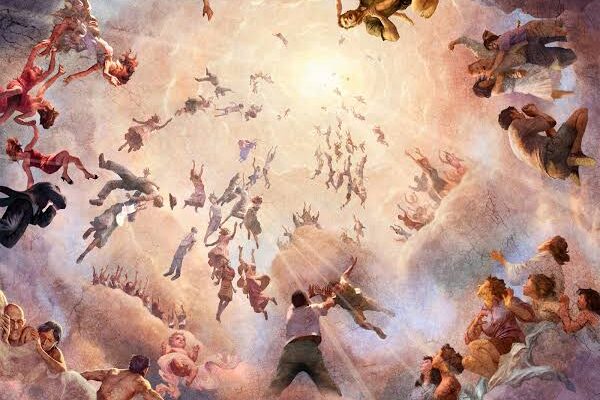In the landscape of eschatological beliefs, one concept that continues to captivate and provoke intense debate is “the rapture.”
A theological doctrine predominantly associated with certain branches of Christianity, the notion of the rapture centers around the idea of an imminent event where believers will be taken up to meet Christ in the air.
This belief, while deeply ingrained in the faith of many, has also sparked considerable controversy and diverse interpretations across religious communities.
This article provides an overview of the concept of the rapture, including its origins, controversies, and cultural impact, while acknowledging the diversity of perspectives, interpretations and truth surrounding this theological doctrine.
Understanding the Concept
The concept of the rapture is often tied to the teachings of the Apostle Paul in the New Testament, particularly in his first letter to the Thessalonians.
In this letter, Paul discusses the return of Christ and the gathering of believers.
According to believers in the rapture, this event will involve the sudden and unexpected disappearance of Christians, who will be taken up to heaven to be with God.
This interpretation has led to various debates surrounding the timing, nature, and implications of this event.

READ ALSO: Unveiling the mystery: Hidden facts of Sodom and Gomorrah
Controversies and Interpretations
One of the primary points of contention revolves around the timing of the rapture in relation to the end times.
While some adherents believe in a pre-tribulation rapture, suggesting that believers will be taken up before a period of great tribulation on Earth, others hold to a mid-tribulation or post-tribulation rapture, positing that it will occur during or after this tumultuous period.
These different views have led to theological debates and varying schools of thought within Christian communities, contributing to the complexity of the discourse.
Cultural Impact and Criticisms
Despite its enduring popularity within certain Christian circles, the concept of the rapture has faced its share of criticisms and skepticism.
Some critics argue that the doctrine of the rapture lacks solid biblical grounding and is a relatively recent interpretation in Christian history.
Additionally, concerns have been raised about the potential effects of this belief on individuals and communities, including complacency or a disengagement from addressing pressing social and environmental issues.
The truth about rapture
While there are many controversies concerning the rapture, the truth still remains. The word ‘rapture’ does not appear in the bible rather the word that implies to mean so is the Greek word, ‘ Harpazo’ which can mean “to be snatcher away”.
These words have been used in different contexts to mean different things which is not strange to Greek, Hebrew or Aramaic language in which the bible was written.
To find out the truth of biblical matters, we must first consider the premise from which certain things have been said.
The word ‘taken’ is used in Matthew 24:40 and Luke 17:35 and is implied to mean the rapture where one is taken and the other left behind.
This is following his analogy that the one who gives up his life will preserve it, which is indicative of one who gives up his will for the will of God to be done in their life resulting in them being chosen by God
In Jude 1:23, the word ‘harpazo’ is also used’. The snatching in this context means a removal or a saving from fire.

To fully understand the words of Jesus and act accordingly, we must read in context the things that he said and why he said it.
The concept of the rapture has been exchanged for the first resurrection which is mentioned in Revelations 20. Here the Lord Jesus speaks to the disciple John of the things to come.
He describes the first resurrection as an exclusive event for those who have gone through tribulation and have not bowed to the beast or received his mark. This point alone refutes the notion that the ‘rapture’ comes before the tribulation.
To further prove the point that the first resurrection will occur after the tribulation, Rev 13 gives more details for the unfolding of events in the earth. It says from verse 7 that the beast was given authority to conquer God’s holy people and further instructs the people saying, “If anyone is to go into captivity, into captivity they will go. If anyone is to be killed with the sword, with the sword they will be killed.” This calls for patient endurance and faithfulness on the part of God’s people,” in verse 10.
According to scriptures, the saints of God will go through tribulation before they are counted worthy to partake in the first resurrection as stated in Rev 20 and they will assume the status of sons of God.
The first resurrection entails a restoration and salvation of the body. The salvation of the body is described as a total restoration to the initial state of Adam who was a son of God.
The bible explains to us that Jesus is the first partaker of the resurrection of the dead in Acts 26:23.
This goes on to mean that if we are to be transformed to the likeness of Christ as we continue to behold him, we will attain a likeness of his resurrected body which enables him to appear to 500 people at once, ascend to heaven, hide himself etc.
Philippians 1:29 says that it has been granted that we not only believe in him but also suffer for his sake.
Our suffering for his sake guarantees us a place with him as heirs of his kingdom. He promises that if we suffer with him, we will reign with him and this reign is also depicted in Rev 20 as the 1000 year reign where those who have been resurrected will get a 1000 year headstart to chair the restoration of the whole earth.
READ ALSO: Rapture: Israel-Hamas tension, other signs of Christ’s imminent coming
Conclusion
While the concept of the rapture remains a significant aspect of certain Christian beliefs, it also remains a topic of ongoing theological inquiry and debate.
Its complexities, controversies, and cultural impact underscore the enduring fascination with eschatological themes and the enduring pursuit of understanding the mysteries surrounding the end times.
As interpretations evolve and discussions persist, the rapture continues to provoke introspection and exploration of the human relationship with faith and the divine.








